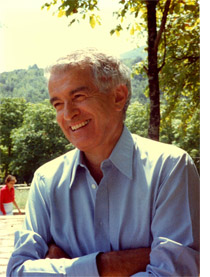
Gerardo Guerrieri
(Matera, February 4, 1920 – Rome, April 24, 1986)
Gerardo Guerrieri made his theatrical debut as a director in 1940, staging Happy Journey by Thornton Wilder at the University Theatre of Rome. He soon expanded his work to other areas of the performing arts, while continuing to direct opera and drama productions of recognized quality.
He collaborated with Luchino Visconti, serving in the rare role in Italy of dramaturg, meaning translator-adapter and dramaturgical consultant. Guerrieri produced some of the finest Italian translations of works by Chekhov, Miller, Williams, Strindberg, O’Neill, Saroyan, and Shakespeare, including a highly acclaimed Hamlet. He also contributed to the screenplays of Bicycle Thieves and Shoeshine by De Sica, and worked as a critic for various newspapers and magazines, including Voce Operaia, L’Unità, Il Giorno, and the Encyclopedia of the Performing Arts, for which he wrote the insightful and still valuable entry on “Actor.” He was also responsible for the first dissemination of Stanislavski’s theoretical writings in Italian.
Together with his wife Anne d’Arbeloff, Guerrieri founded the Teatro Club, which in 1969 established the Premio Roma. He played a decisive role in introducing major international performing arts events to the Italian public, organizing tours in Rome that helped break its cultural isolation. These included performances by the Living Theatre, Jerzy Grotowski, Peter Brook, and shows featuring Indian, Chinese, and Tibetan dance, as well as leading foreign playwrights.
Guerrieri co-founded and co-directed, with Paolo Grassi, the Einaudi Theatre Series. He authored several radio dramas and collaborated with RAI for many years. He devoted much of his energy to research, often resulting in unfinished projects due to various circumstances. His studies focused particularly on the actor, explored from sociological, psychological, anthropological, and historical perspectives. One of his most passionate pursuits was the study of Eleonora Duse, for whom he collected documents from around the world over more than thirty years. He organized three exhibitions and a major conference in 1958 to mark the centenary of the actress’s birth.
An eclectic figure, Guerrieri was described in the United States as a “modern Leonardo.” He possessed a refined mastery of writing, whether in essays, journalism, or translation. By personal inclination, he often chose to remain behind the scenes, yet his role as a key figure in Italian theatre is undeniable and still awaits full recognition.
